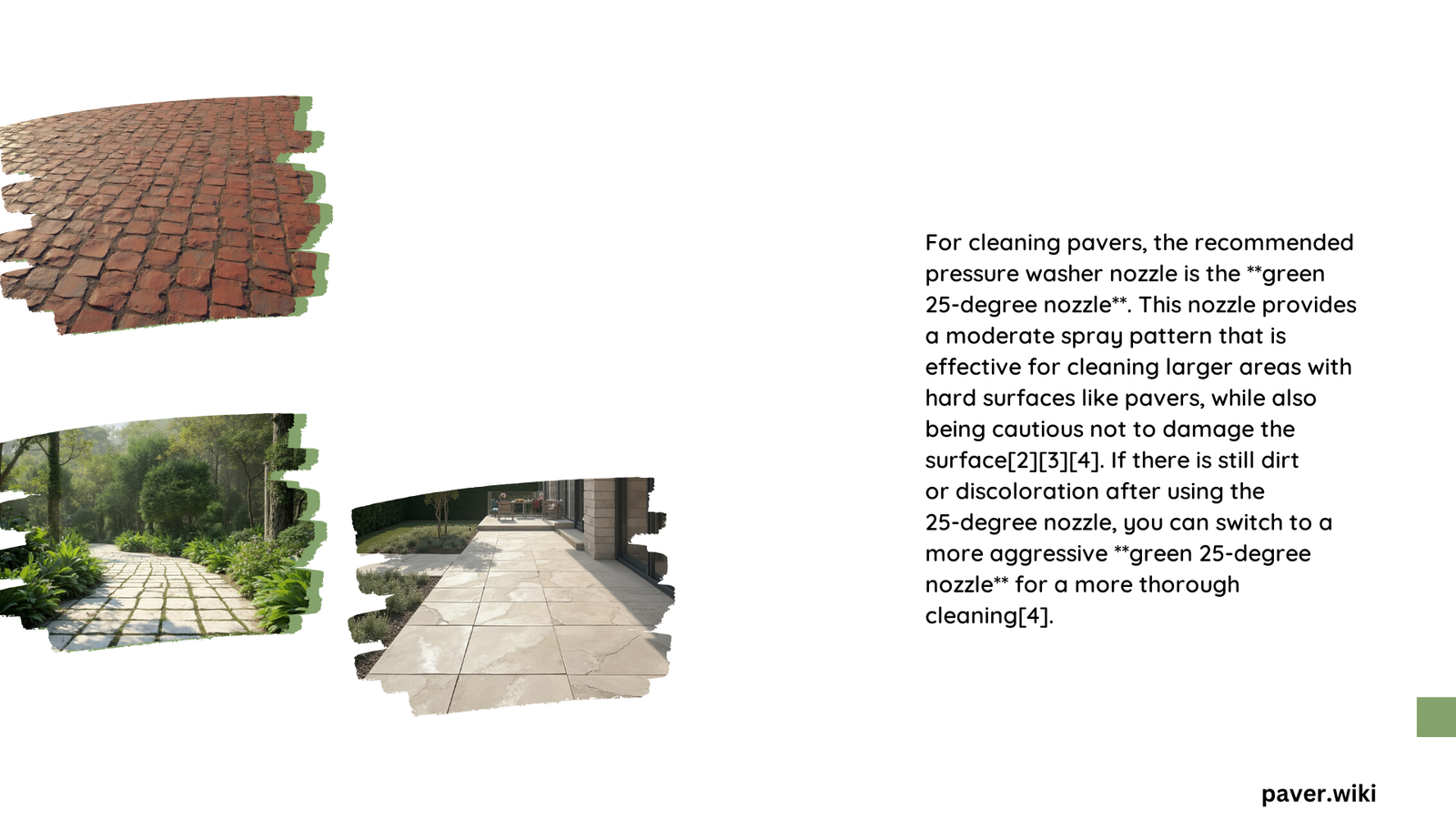Choosing the right pressure washer nozzle for pavers is crucial for effective cleaning without causing damage. The optimal nozzle depends on the paver material, dirt level, and pressure washer specifications. Generally, a 25° (green) nozzle is versatile and safe for most paver types, while a 15° (yellow) nozzle can tackle tougher dirt. Always consider the paver material and adjust pressure accordingly to avoid damage.
What Are the Different Types of Pressure Washer Nozzles for Pavers?
Pressure washer nozzles come in various types, each designed for specific cleaning tasks. Here’s a breakdown of the most common nozzle types and their suitability for cleaning pavers:
- 0° (Red) Nozzle
- Produces a concentrated, high-pressure stream
- Too intense for most paver cleaning tasks
- Can cause damage to paver surfaces
-
Best reserved for extremely stubborn stains on hard surfaces
-
15° (Yellow) Nozzle
- Suitable for heavy-duty cleaning
- Effective on concrete and brick pavers
- Provides a narrower spray pattern than 25° nozzle
-
Use with caution to avoid paver damage
-
25° (Green) Nozzle
- Most versatile and recommended for paver cleaning
- Offers a broad spray pattern with effective cleaning power
- Safe for most paver types (concrete, brick, stone)
-
Maintain proper distance to prevent damage
-
40° (White) Nozzle
- Best for delicate surfaces
- May be too gentle for heavy dirt on pavers
- Suitable for rinsing or cleaning softer materials
How to Choose the Right Nozzle Size for Your Pressure Washer?

Selecting the correct nozzle size is crucial for optimal cleaning performance. Consider the following factors:
- Pressure Washer Flow Rate: Match the nozzle size to your pressure washer’s flow rate (typically 3.0 to 4.0 GPM for residential models).
- Manufacturer Specifications: Always consult your pressure washer’s manual for recommended nozzle sizes.
- Cleaning Task: Heavier dirt may require a smaller nozzle size for increased pressure.
| Flow Rate (GPM) | Recommended Nozzle Size (inches) |
|---|---|
| 2.0 – 2.5 | 0.025 – 0.035 |
| 2.5 – 3.0 | 0.035 – 0.040 |
| 3.0 – 3.5 | 0.040 – 0.045 |
| 3.5 – 4.0 | 0.045 – 0.055 |
What Spray Pattern is Best for Cleaning Pavers?
The spray pattern plays a significant role in cleaning efficiency and surface protection. For paver cleaning:
- Fan Spray Pattern: Provided by 15°, 25°, and 40° nozzles
- More effective for general paver cleaning
- Covers a wider area
-
Less likely to cause damage
-
Pinpoint Spray Pattern: Provided by 0° nozzle
- Too concentrated for most paver cleaning tasks
- Can cause surface damage if not used carefully
- Only use for extremely stubborn stains in small areas
Which Nozzle Material is Most Suitable for Paver Cleaning?
The material of the nozzle affects its durability and performance. Consider these options:
- Plastic Nozzles
- Less durable
- Suitable for light cleaning tasks
-
Not recommended for frequent or heavy-duty paver cleaning
-
Brass Nozzles
- More durable and resistant to wear
- Can withstand high pressure
- Less likely to corrode or break down
- Highly recommended for paver cleaning
What Pressure Settings Should Be Used for Different Paver Types?
Proper pressure settings are crucial to avoid damaging pavers while ensuring effective cleaning. Here’s a guide for different paver materials:
- Concrete Pavers
- Pressure: 2,000 – 3,000 PSI
-
Nozzle: 25° (Green) or 15° (Yellow) for tougher dirt
-
Brick Pavers
- Pressure: 1,500 – 2,000 PSI
-
Nozzle: 25° (Green) or 40° (White) for older or more delicate bricks
-
Natural Stone Pavers
- Pressure: 1,500 – 2,500 PSI
-
Nozzle: 25° (Green) or 40° (White) for softer stones
-
Interlocking Pavers
- Pressure: 2,000 – 3,000 PSI
- Nozzle: 25° (Green) or 15° (Yellow) for joints
Always start with lower pressure and a wider spray pattern, then adjust as needed.
How to Address Accessibility Issues When Cleaning Different Paver Configurations?
Cleaning pavers can be challenging due to various layouts and configurations. Here are some tips to address accessibility issues:
- Tight Spaces and Corners
- Use a 15° nozzle with caution
-
Consider a surface cleaner attachment for uniform cleaning
-
Large Open Areas
- Opt for a 25° nozzle for efficient coverage
-
Maintain consistent distance and overlapping passes
-
Elevated or Stepped Pavers
- Use extension wands to reach difficult areas
-
Adjust nozzle angle for proper cleaning of vertical surfaces
-
Paver Joints
- Use a 15° nozzle to clean between pavers
-
Be careful not to dislodge joint sand or damage edges
-
Patterns and Intricate Designs
- Start with a 40° nozzle to avoid damaging delicate patterns
- Switch to a 25° nozzle for stubborn dirt, maintaining extra caution
By considering these factors and following the guidelines, you can choose the right pressure washer nozzle for your pavers, ensuring effective cleaning without causing damage. Always test in an inconspicuous area first and adjust your approach as needed based on the results.
